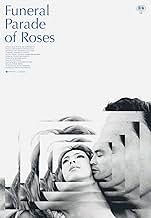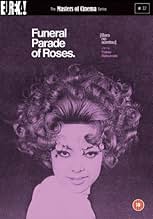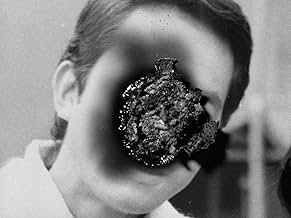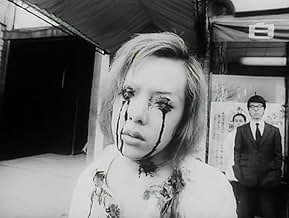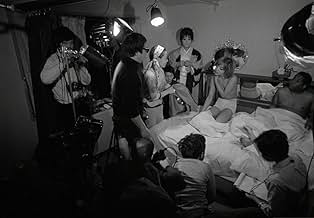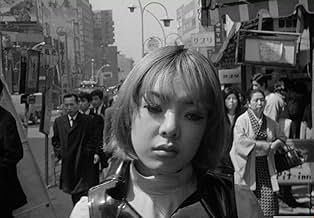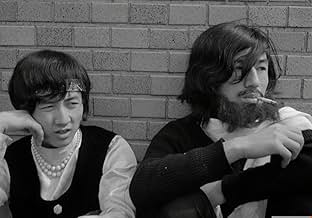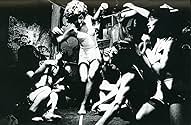The trials and tribulations of Eddie and other transvestites in Japan.The trials and tribulations of Eddie and other transvestites in Japan.The trials and tribulations of Eddie and other transvestites in Japan.
- Director
- Writer
- All cast & crew
- Production, box office & more at IMDbPro
Featured reviews
If you really are looking for a good time in a movie theatre - watch this movie ! It has been said that some of Kubrick's visual and sonic ideas for "Clockwork Orange" were inspired by this movie; after having seen it, i'm more than convinced that this is true.
This movie offers a lot of cinematic ideas and it uses surprising ways to make a point within a story.
What is the reason that films with a spirit and mood like that have vanished from the screen ? Have the politics in the movie industry really become so strict ? This movie watched nowadays has (but maybe had always) a subversive feel to it, why is that ?
It definitely offers something different and therefore would be very welcome in movie theatres and videostores around the world to free us from all the uninspired formula movies.
This movie offers a lot of cinematic ideas and it uses surprising ways to make a point within a story.
What is the reason that films with a spirit and mood like that have vanished from the screen ? Have the politics in the movie industry really become so strict ? This movie watched nowadays has (but maybe had always) a subversive feel to it, why is that ?
It definitely offers something different and therefore would be very welcome in movie theatres and videostores around the world to free us from all the uninspired formula movies.
I am not a fan of avent-garde films, which I find are often pretentious and silly, but I enjoyed "Funeral Parade of Roses", primarily because I found the main character "Eddie" (played by Shinnosuke Ikehata aka "Peter") fascinating. The film is a non-linear composite of drama and documentary like vérité punctuated by abstract inclusions (jump cuts to stills, substitution splices, etc), some of which are more effective than others. Supposedly, Kubrick drew inspiration for "A Clockwork Orange" (1971) from this film and there are certainly some similarities (at one point Eddie looks straight at the camera through up cast eyes in a scene that reminded me of the iconic opening shot of "Alex" in Kubrick's film). Lacking much of a plot, "Funeral Parade of Roses" primarily peers into Tokyo's gay scene and follows Eddie, a transvestite 'bar girl' as he moves amoungst his friends (including pretentious auteur 'Guevara') in hopes of luring boss Gonda (Yoshio Tsuchiya) from rival, and bar 'Madame', Leda (Osamu Ogasawara), perhaps becoming 'Madame' himself. The black-and white cinematography is lovely, the characters intriguing and photogenic and the direction, for the most part, excellent (the interminable toking scene not withstanding). While the film is nonlinear, there is a traditional 'climactic' sequence at the end that is well worth waiting for and explains many of the references to the film being an Oedipal myth. Not to everybody's tastes but well worth trying out.
An unsettling and astonishing Japanese film that introduced me to the Japanese New Wave movement.
"Funeral Parade of Roses," like many of the best works of art, defies description or categorization. It dives into the Japanese gay sub-culture of the 1960s, and specifically young gay men who dress and act like women. It blurs the line between fact and fiction; at times, the actors in the movie become actors in a movie within the movie, and the movie itself becomes a documentary about the making of a movie about gay Japanese youths. If you can follow that sentence, then you're on the way to having the right sensibility to enjoy this film.
It's a shocking movie too, going places most other films at the time, and certainly few American movies, would dare. The only big American movie I can think of from that time period that comes even close to tackling subjects that general audiences would find equally unsavory is "Midnight Cowboy," and this film makes that one look like a Doris Day romp in comparison.
Grade: A
"Funeral Parade of Roses," like many of the best works of art, defies description or categorization. It dives into the Japanese gay sub-culture of the 1960s, and specifically young gay men who dress and act like women. It blurs the line between fact and fiction; at times, the actors in the movie become actors in a movie within the movie, and the movie itself becomes a documentary about the making of a movie about gay Japanese youths. If you can follow that sentence, then you're on the way to having the right sensibility to enjoy this film.
It's a shocking movie too, going places most other films at the time, and certainly few American movies, would dare. The only big American movie I can think of from that time period that comes even close to tackling subjects that general audiences would find equally unsavory is "Midnight Cowboy," and this film makes that one look like a Doris Day romp in comparison.
Grade: A
10NateManD
"Funeral Parade of Roses" is an underrated unknown work of Japanese gay cinema. It was one of Stanly Kubric's favorite films, and it had a significant influence on the the style of "A Clockwork Orange". The film deals with Japanese drag queens, including the clubs, rivalry and their sex lives. In an Oedipus fashion, except reversed, the main character kills his mother so he can have relations with his father. Director Toshio Matsumato seemed to be way ahead of his time for his portrayal of sexuality and violence on screen. Also in a Bergman like fashion, actors are interviewed so the audience realizes it's only a movie.(and a twisted one at that) The film has many hallucinatory scenes, and who could forget the drag queens using urinals. There's also a weird fight scene between the two drag queens, and when they yell comic bubbles pop out of their mouths. Thank God this movie is in black & white! It's very brutal, disturbing and violent at times; so watch with caution. "Funeral Parade of Roses", is simply shocking and brilliant!
This is a movie that was made in the late '60s, early '70s period of Japan when Japan influenced by the Hippie culture was experimenting with their own brand of Avant Garde culture that was sometimes called "Angura". This is shortened Japanese pronunciation for "Underground". As the word suggests, these were experimental non-mainstream production that explored much about free sex, and anti establishment view of the world.
Gay culture was almost never picked up in Japanese movie up to this point, and it was first public exposure to the literally underground culture of the society at that time. This movie was also the debut for Pita or Shinnosuke Ikehata as Eddie. He has become somewhat of an icon for gay culture in Japan, but this movie was actually the first time he appeared as gay in public, and prior to that, he was only known as a beautiful boy dancer. His father was a natori of Japanese dance school, and he is a trained dancer himself.
Producers of this movie auditioned over 100 candidates, but couldn't find the right talent. Novel writer Tsutomu Minakami told the producers about "this boy" who was a go go dancer at a club in Roppongi. When the producers went to the club, and met the then 16 year old Ikehata, they knew they had the right person. Ikehata had a nick name Pita from Peter Pan, as he was so beautiful, and it was difficult to tell if he was a boy or a girl.
Story is bit convoluted, Eddie, who is the top host at the club Junne has intimate relation with the club's owner Gonda (Yoshio Tsuchiya). When the madam of the club Leda discovers this, he goes into a jealous frenzy, and tries to hurt Eddie. Eddie gets an idea to kill Leda, but that also brought back his suppressed memory of killing his own mother. Leda makes an attempt on Eddie's beauty by trying to cut his face, but fails. Gonda dumps Leda, and Leda commits suicide. But Gonda finds out the real truth about the relation between himself and Eddie.
The production of this movie is above average for avant garde movies made during this period. There's humor, talent, interesting point of view, and a real story. This is one of must see movies to come out of Japan.
Gay culture was almost never picked up in Japanese movie up to this point, and it was first public exposure to the literally underground culture of the society at that time. This movie was also the debut for Pita or Shinnosuke Ikehata as Eddie. He has become somewhat of an icon for gay culture in Japan, but this movie was actually the first time he appeared as gay in public, and prior to that, he was only known as a beautiful boy dancer. His father was a natori of Japanese dance school, and he is a trained dancer himself.
Producers of this movie auditioned over 100 candidates, but couldn't find the right talent. Novel writer Tsutomu Minakami told the producers about "this boy" who was a go go dancer at a club in Roppongi. When the producers went to the club, and met the then 16 year old Ikehata, they knew they had the right person. Ikehata had a nick name Pita from Peter Pan, as he was so beautiful, and it was difficult to tell if he was a boy or a girl.
Story is bit convoluted, Eddie, who is the top host at the club Junne has intimate relation with the club's owner Gonda (Yoshio Tsuchiya). When the madam of the club Leda discovers this, he goes into a jealous frenzy, and tries to hurt Eddie. Eddie gets an idea to kill Leda, but that also brought back his suppressed memory of killing his own mother. Leda makes an attempt on Eddie's beauty by trying to cut his face, but fails. Gonda dumps Leda, and Leda commits suicide. But Gonda finds out the real truth about the relation between himself and Eddie.
The production of this movie is above average for avant garde movies made during this period. There's humor, talent, interesting point of view, and a real story. This is one of must see movies to come out of Japan.
Did you know
- TriviaLes Funérailles des roses (1969) gave Stanley Kubrick several visual and aural inspirations for his adaptation of Orange mécanique (1971).
- GoofsAll entries contain spoilers
- ConnectionsEdited from Ecstasis (1969)
- SoundtracksO du lieber Augustin
- How long is Funeral Parade of Roses?Powered by Alexa
Details
Box office
- Gross worldwide
- $1,114
- Runtime1 hour 45 minutes
- Color
- Sound mix
- Aspect ratio
- 1.37 : 1
Contribute to this page
Suggest an edit or add missing content

Top Gap
By what name was Les Funérailles des roses (1969) officially released in India in English?
Answer

